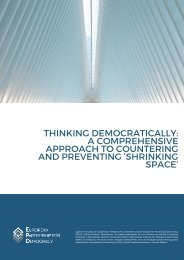Political Party Guidelines Eng
You also want an ePaper? Increase the reach of your titles
YUMPU automatically turns print PDFs into web optimized ePapers that Google loves.
How to change culture
When we step into a car, we take it for granted that a seat belt is provided and that we use it. Before the
1950s people did not. Every day in different parts of the world, hundreds of people died unnecessarily in
car crashes, as there were no belts. Now we have legislation about it, and all car manufactures follow the
legislation and provide the belts.
Yet it took decades to make customers understand the benefit of doing this. Many countries have stipulated
usage of seat belts in legislation, and there have also been big campaigns to make people aware of
the benefit of this safety measure. Despite this, some people still refuse to use them. Every year there are
unnecessary deaths due to this. Most people in most countries understand the need to protect themselves.
There are no estimates of how many billions of dollars have been saved, thanks to us learning to use seat
belts, but it is clear that it is a vast sum of money.
Improving safety procedures and people learning to follow the new regulations are good examples of
cultures changing quite fast. To change the culture of quietly approving VAW, we need male gender champions
– well known politicians, writers, musicians, movie stars – who openly talk of women’s rights and the
emotional and financial costs of VAW.
3.12 Gender based harassment
Another proof of the fact that cultures do change is the #Me Too -campaign. A few years ago no-one
could have imagined that sexual harassment experienced by women would become so widely talked
about, and so unanimously condemned. The way women are being treated is changing. What was considered
acceptable earlier on, is no more.
However, buried in the structures of many organisations, old attitudes persevere. Politics and power are
connected, and one element of power is its tendency to corrupt. This corruption often manifests itself
in a powerful person’s misuse of his/her power as unwelcome sexual advances.
Sexual harassment is defined by UN in the following way:
“Sexual harassment is any unwelcome sexual advance, request for sexual favor, verbal or physical conduct
or gesture of a sexual nature, or any other behavior of a sexual nature that might reasonably be expected
to cause offence or humiliation to another, when such conduct interferes with work, is made a condition of
employment or creates an intimidating, hostile or offensive work environment. While typically involving a
pattern of behavior, it can take the form of a single incident. Sexual harassment may occur between persons
of the opposite or same sex.” 37
Political parties must make sure that they write a policy on harassment and abuse of
authority, and have proper procedures and mechanisms in place to tackle sexual harassment. These
include a written and binding code of conduct for cases of harassment. Effective means to cope with the
problem are e.g. 1) having a complaint mechanism: nominating within the party persons from
different units as so-called focal points, to whom people who have encountered harassment can report; 2)
establishing a means to report incidences anonymously, if need be, and; 3) creating support
mechanisms for those, who have been harassed.
It should be noted that abuse of authority can take many forms. If in a political meeting a man in an
authority position tells a woman, who is expressing her opinions (as people in meetings generally do),
to be quiet, he is breaking the norm of decent behavior, and he is abusing his power position. Similarly
ordering women to make tea instead of taking part in a meeting can be seen as abuse of power.
22
GUIDELINES FOR POLITICAL PARTIES IN MYANMAR


















